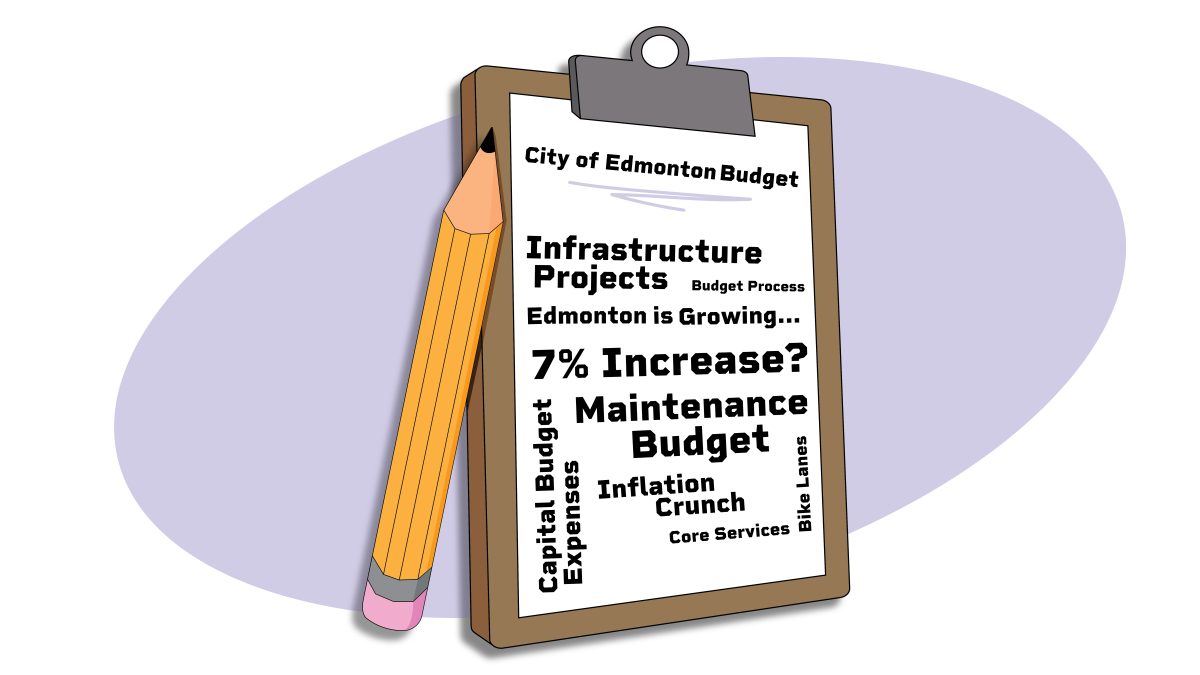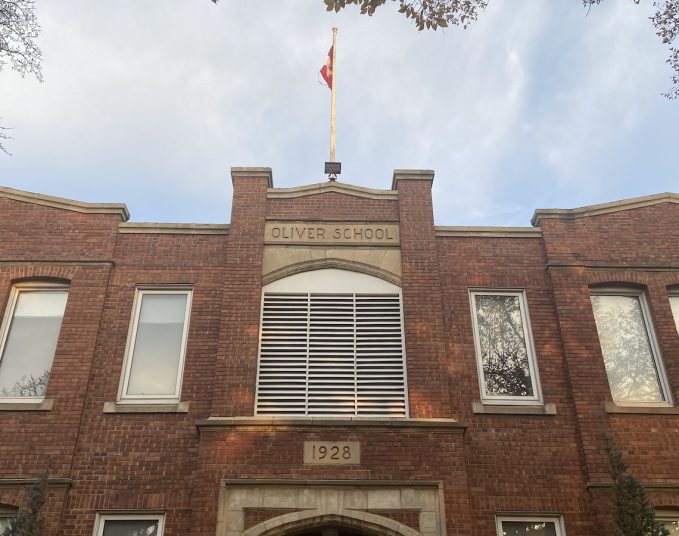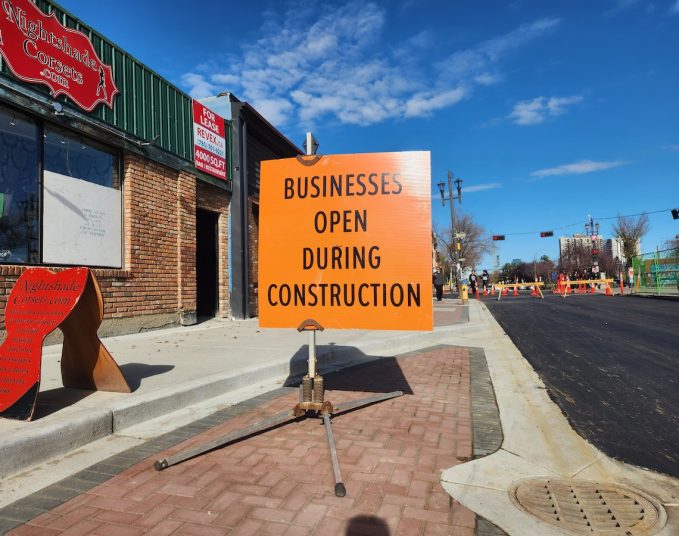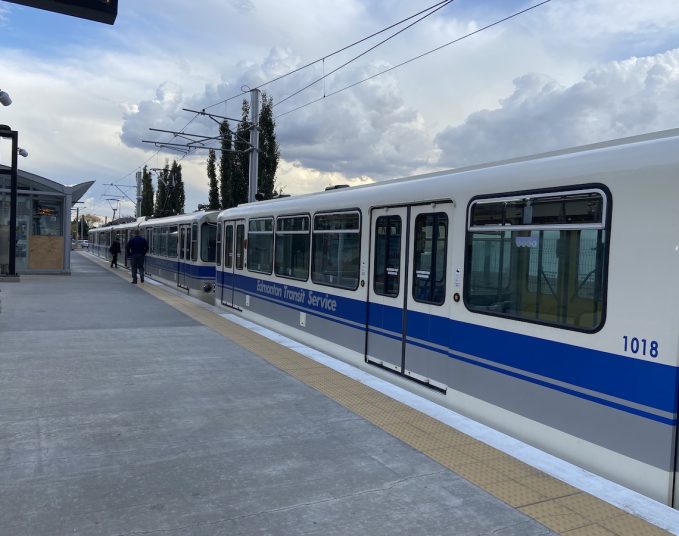Next week, City Council begins a two-week process of going through a series of budget adjustments. What’s on the table? A potential tax hike of 7.09 per cent.
There’s a lot to it; inflation is driving the cost of pretty well everything upward, from the cost of construction to the spiking expense of fuel that’s needed to fill City vehicles. A settlement with Edmonton Police Service is accounting for 1.63 per cent of that tax increase. There are some pressing infrastructure projects, including road repairs and maintenance work that needs to be done to Rogers Place, which adds about $80 million to the budget. And there’s also an ongoing battle with City workers who have been out of a contract since 2020.
And, City Council has several options in front of it when it comes to dealing with a massive hole in the maintenance budget — the money needed to keep the trains running and buildings in good shape. Replenishing the hundreds of millions needed will take years. It’s not a question of if the budget hole needs to be filled, it’s how. It’s a matter of a higher tax hit over a shorter period of time, or a gradual tax hit over a longer period of time.
Edmonton is not alone. The inflation crunch is hitting cities across Canada. This week, Calgary’s city council will be looking at a budget adjustment that could boost tax rates by 7.8 per cent. In Ottawa, residential taxes may only go up by 2.5 per cent, but the nation’s capital is raising parking rates, hotel taxes and user fees for everything from transit fares and pet permits to an 11.5 per cent spike in garbage pick-up charges. Regina’s taxes will be up a little more than five per cent, but the city has delayed several approved infrastructure projects to keep the tax hike where it is.
So, Urban Affairs reached out to every member of City Council to ask their opinions about the upcoming budget process. This is a week off before budget deliberations begin — so, understandably, not everyone was able to respond.
Is a Seven Per Cent Tax Increase Inevitable?
Mayor Amarjeet Sohi: “The rising costs of essentials like utilities and fuel, and the investments made in public safety, are driving the tax rate proposed by Administration higher. I will be reviewing this budget comprehensively to find further savings without compromising service levels. Edmontonians deserve high-quality, affordable public services, especially in tough economic times when we all rely on public services more than ever.”
Tim Cartmell: “Well, on the one hand, I don’t know where we get agreement at council on what to reduce. On the other hand, I have been going through the numbers and the growth in tax revenue from 2022 to 2026 is enormous. And I haven’t figured out yet where all that money is going. There should be a way arithmetically, but I don’t know if there is a way politically.”
Anne Stevenson: “While I’ll be looking to see if we can move things below a seven per cent increase, it’s important to me that we don’t make short-sighted decisions. A lot of the budget pressures we’re facing right now are a result of underinvesting in core services for years. We need to avoid looking only at the next 12 months and instead make sure we’re thinking about the next 10-20 years.”
Karen Principe: “I believe there are opportunities to find some savings, it is no easy task though. It is possible that something will have to be put on hold for now to find savings. Almost all is on the table except for anything that would negatively impact public safety.”
Andrew Knack: “I think there are some things we can do to get that number under seven per cent. The question is, how much lower than seven per cent?” Knack thinks a higher-than-expected dividend from EPCOR could be used to help mitigate the tax increase, even if only by a little. But Knack said it’s not a realistic ask for Edmonton to hold the line on taxes — because of this city’s population spike. “One thing I think has been glossed over in this process is the fact that Edmonton has grown by 70,000 people over the past two years. That is like two cities of Spruce Grove. Imagine building a city of that size from scratch. I think that trying to hold taxes at zero per cent when you have that type of growth is unrealistic.”
Jennifer Rice, when asked if she could support a tax increase of over seven per cent: “No, I can’t. What I do think the City needs to do is focus on the core services. I have big concerns. I’ve already received many emails from residents who are concerned about this increase.
Michael Janz: “We’re paying the cost for urban sprawl that has gone out of control, and what we spend on policing.”
Sarah Hamilton: “Absolutely there’s a way to sharpen pencils and find savings, but the question isn’t if, but if council has the appetite to cut a level or service or a service altogether. The proposed increase isn’t comprised of nice-to-haves, though — it reflects the pressures Edmontonians are feeling in our own households, such as inflation.”
Keren Tang: “For me, 7.09 per cent is too high especially during this time of affordability challenges Edmontonians are facing. However, municipalities around the country are facing significant funding shortfalls, and the proposed tax increase is consistent with many of the other major urban centres, and even some mid-sized or smaller communities. With the provincial MSI (Municipal Sustainability Initiative) program that funds capital projects with municipalities switching to the LGFF (Local Government Fiscal Formula), Edmonton will be receiving significantly less funding, perpetuating the infrastructure and renewal deficits we are facing and subsequently the City’s financial challenges.”
What’s The Mood of Council Going Into This?
Divided. At least, that’s what Janz sees. He said there is “growing resentment” for councillors who he says add things to budget shopping lists, but then vote against the capital or operating budgets when they get to the final hurdles.
Earlier in this term, Cartmell, Hamilton, Principe and Rice opposed the $8 billion, four-year capital budget. The operating budget of just over $3 billion for 2023 was approved 8-5, with Knack added to the four who opposed the capital portion of the plan.
Janz said that at the start of the term, councillors who voted against the budget were heavily in support of big-ticket items like the velodrome in Coronation Park, or the Lewis Farms recreation centre.
“It has become a game of chicken. No one wants to wear a tax increase, but we all have to have some accountability. If you vote against the budget, you shouldn’t come to the ribbon cuttings or the grand openings. We need to have a level of political maturity.”
Said Stevenson: “I think we need to bring all ideas to the table — it’s going to take a lot of hard work and creativity to strike a balance between investments we need to make and moderating the financial impact on Edmontonians, but I’m confident we can get there.”
Knack doesn’t believe council is divided.
“I think we are still going to be going through the process in a good-natured way. Sure, there are going to be times when things get heated. But I have sat on previous councils that were truly divided because of the actions of one or two councillors. I know what a divided council is like.”
Janz credited Mayor Sohi with bringing council together during the previous budget process; he said the process was smooth, as councillors were asked what they could support and what they couldn’t, leading to an omnibus package that had some level of consensus before the final deliberations.
“Weighing the competing priorities is important, whether they are from Council or from Edmontonians,” said Sohi. “Collaborative leadership is key to finding solutions that everyone can accept and this Council has proven our capacity to work together to tackle big issues.”
What Are The Priorities?
Sohi: “We heard clearly that Edmontonians wanted increased investment in public safety and this council has made several decisions that have done that, including approving the new police funding formula earlier this year. It is crucial for council to remain accountable for past decisions and I will continue to emphasize the importance of honouring these commitments in the budget discussions. We passed a budget based on affordability, not austerity.”
Janz: “From talking to council, there seems to be a high desire to improve transit — cleanliness, frequency.” (There is a $1.8 million enhanced transit cleanliness package in the budget update).
Stevenson: “Climate action, transit, and addressing homelessness will be key priorities for me going into these deliberations.”
Hamilton: “I think there are a few things that are considered untouchable, like the base budget, and some that are not untouchable but create some regulatory issues — relating to labour agreements, or provincial legislation. Obviously what makes the conversations at budget so difficult is that these perspectives vary widely amongst different councillors and different geographic parts of the city.”
Tang: “We’ll be reviewing the budget line by line, again this year, to identify areas of priority alignment and room for savings. Similar to the four-year budget deliberation, I believe everything should be on the table, especially during exceptional years like right now. This includes reviewing our agencies, boards, and commissions, and even revisiting how we are investing to achieve our important climate and carbon goals.”
Janz: “We are an organization that’s about people. And people deserve to be treated fairly, as banks raise interest rates and gouge us, as the grocery-chain cartels raise the price of food.”
Hamilton: “Cities are service-driven levels of government, which means they are people-intensive, that is a reality. Salary settlements are likely to be a theme over the next few years as our unions settle. These are pressures that are difficult, but not impossible, for the city to manage, but something we need to know from residents is if we see service cuts, what is the preferred area for reductions, or would they prefer to see increases tied to service performance.”
Rice: Several times during our interview, Rice repeated the need to focus on core services. And, in order to save money, she wondered if some previously approved infrastructure projects could be placed on hold. “Like our bike lanes. Are those urgent? That could be $100 million right there.”
Knack said that he doesn’t see a lot of flexibility in the capital side of the budget. The projects that need to get done are the projects that need to get done, but said he is disappointed the City has yet to see the savings that were supposed to be the result of the prior operating budget.
And The Police…
While the 2023 salary settlement between the police and the City came out of arbitration, Janz believes that some capital police items can be placed on hold, to see if they’re really needed.
He said the provincial moratorium on photo radar has cost the City $25 million, and he believes the City needs to think of ways to use police more efficiently. He doesn’t believe the police should be social-service workers or “taxi drivers” for the homeless. He believes that we need officers on the ground doing what they’re trained to do.
“We need to be paying the police to do the right thing at the right time for the right purpose, at the right cost.”
Janz’s motion to ask the police to open their books when it comes to salaries was recently passed by council. This will require EPS to disclose how many staff are making $100,000 or more per year.
Savvy AF. Blunt AF. Edmonton AF.




